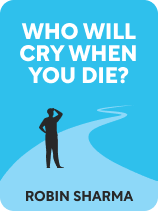

This article is an excerpt from the Shortform book guide to "Who Will Cry When You Die?" by Robin Sharma. Shortform has the world's best summaries and analyses of books you should be reading.
Like this article? Sign up for a free trial here .
Is Robin Sharma’s Who Will Cry When You Die? worth reading? How was the book received by the critics and what are its strengths and weaknesses?
In Who Will Cry When You Die?, self-help guru Robin Sharma wants to know if you’ll feel happy with the life you’ve led when you’re on your deathbed. If you think you might have end-of-life regrets, Sharma provides a collection of pithy life lessons and advice to help you seize control of your life and turn it into one you’ll look back on fondly.
Continue reading for our Who Will Cry When You Die? review.
What’s the Book About?
In Who Will Cry When You Die?, Robin Sharma demands you ask yourself if, on your deathbed, you’ll look back on life and feel you got the most out of it. If right now, your answer to this is “no,” Sharma provides 101 pieces of advice to help you build a life you’ll feel good about. These range from broad perspective shifts to specific actionables, all with the aim of giving you greater control over your life so you can make it one worth living.
About the Author
Robin Sharma is a world-renowned leadership expert, author, and speaker. Sharma started a career as a litigation lawyer, but he quit that high-stress, high-pay lifestyle at age 25 because he felt unfulfilled. In 1995, he penned and self-published MegaLiving: 30 Days to a Perfect Life, a self-help book based on his takeaways from biographies of people he admired. However, it wasn’t until the release of his second book, The Monk Who Sold His Ferrari, a spiritual guide in the form of a parable, that Sharma gained recognition as a self-improvement guru.
Since then, Sharma’s published several other books, including The Saint, The Surfer and the CEO (2002), The Greatness Guide 1 and 2 (2006 and 2008), The Leader Who Had No Title (2010), Little Black Book for Stunning Success (2016), The 5AM Club (2018), and The Everyday Hero Manifesto (2021). All of these books fall under the umbrella of self-improvement or leadership development.
Sharma’s books are now only a facet of a massive brand he’s created around his coaching and self-improvement work. Through Sharma Leadership International, which he founded in 1997, he advises organizations like NASA, Microsoft, Nike, Unilever on leadership and growth tactics. He also produces online courses and video training series, as well as a podcast called The Robin Sharma Mastery Sessions, in which he dispenses life and self-improvement lessons. Further, Sharma founded The Robin Sharma Foundation for Children, which raises and donates funds to children-focused charities.
Connect with Robin Sharma:
The Book’s Publication
Publisher: HarperCollins Publishers
Robin Sharma published Who Will Cry When You Die? in 1999, the same year that HarperCollins republished The Monk Who Sold His Ferrari for wider distribution. The former book is subtitled “Life Lessons from The Monk Who Sold His Ferrari” and is thus arguably a follow-up to The Monk Who Sold His Ferrari.
The Book and Author’s Impact
Who Will Cry When You Die? achieved the greatest recognition in India, where it’s published by Jaico Publishing. Compared to Sharma’s other books, this is one of his lesser-read works.
Sharma himself, though, has become a world-renowned author, speaker, and social media personality. He has a passionate following who attend his leadership conferences, and his social media followers number in the millions across Facebook, Twitter, and Instagram. He’s sold over 20 million books translated into 75 languages in over 75 countries. Sharma’s delivered speeches and coaching sessions all over the world and has been on stages alongside celebrities like Jack Welch, Shaquille O’Neal, and Richard Branson. His book The 5AM Club counts Jennifer Aniston, Gwyneth Paltrow, and Kris Jenner among its adherents.
Intellectual Context
This book is a collection of existing ideas and philosophies around what constitutes a good life, not a set of concepts Sharma came up with. Sharma draws heavily on Buddhist and Hindu thought, as well as on the philosophies of thinkers, artists, and writers he admires. Henry David Thoreau, Aristotle, Johann Goethe, Helen Keller, and Albert Camus are just some of the personalities whose work and ideas he mentions.
Sharma also draws on contemporary self-improvement books to support his arguments, like Mihaly Csikszentmihalyi’s Flow and Julie Cameron’s The Artist’s Way. He even sometimes mentions contemporary films, like Jerry Maguire. In short, Sharma references any work he feels will help get his arguments across.
Who Will Cry When You Die? differs in approach and presentation from other books in the self-improvement genre. First, unlike many self-help works, Sharma relies less on science than on philosophy and personal experience to explain his points. This is similar to a book like Rachel Hollis’s Girl, Wash Your Face, which is based primarily on Hollis’s takeaways as a professional woman and mother. By contrast, Shawn Acor’s The Happiness Advantage, for instance, is based on neuroscientific research.
Second, as discussed above, Who Will Cry When You Die? is a collection of many different ideas on how to lead a better life, not a linear approach based on a single principle or hypothesis. By contrast, Don Miguel Ruiz’s The Four Agreements, for example, is based solely on traditional Toltec teachings.
Critical Reception
Who Will Cry When You Die? reviews were largely positive. Readers appreciated the book for the short and varied advice they can revisit at any time. Proponents of the book also like the accessible language and Sharma’s anecdotes, which lend a personal touch to the sometimes broad suggestions.
Other readers disliked the recycled nature of the advice and felt there was nothing novel or surprising in this book. Some also took issue with Sharma’s writing style, which they feel is unsophisticated.
Commentary on the Book’s Organization
Sharma breaks Who Will Cry When You Die? into 101 bite-sized chapters, each containing a different piece of life advice. These range from suggestions to “Be a Better Parent” to “Collect Quotes That Inspire You.”
Sharma presents advice in no particular order and switches from specific to broad topics from one chapter to the next. For instance, Chapter 36 is a specific recommendation to read the book Tuesdays with Morrie, while Chapter 37 contains the broader advice to “Master Your Time.” For this reason, it’s easy to read the book in a non-linear fashion, rather than in order, as each chapter is self-contained and not necessarily linked to those around it.
Commentary on the Book’s Approach
Sharma writes in a casual, accessible style. His approach is to inspire rather than convince through the application of logic: He usually presents ideas without scientific backing and doesn’t expand greatly on them or try to justify them to the reader. For instance, Chapter 77, “Be Humble,” begins with a quotation from his father and then swiftly ends with a story about Sharma’s meeting with Muhammad Ali. Sharma thus doesn’t try to convince you to be humble but rather seeks to inspire you to be humble by relaying his beliefs and experiences.
Though chapters differ in structure, they’re almost all guided by quotations and personal anecdotes. Sharma leads at various times with quotations by thinkers like Camus and Rousseau and anecdotes about his children and father.
This book is arguably best for those who want easy jolts of inspiration and wisdom, rather than readers seeking a cohesive and well-researched work.

———End of Preview———
Like what you just read? Read the rest of the world's best book summary and analysis of Robin Sharma's "Who Will Cry When You Die?" at Shortform .
Here's what you'll find in our full Who Will Cry When You Die? summary :
- Why most people end up leading lives they’ll regret
- How to seize control of your life and turn it into one you’ll look back on fondly
- How and why you should set intentional breaks in your daily life






